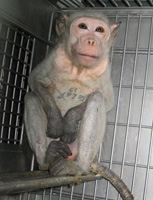Lousy Treatment of Animals in Lab Costs U. of Kansas 62,500 Dollars
 |
Business as usual at the University of Kansas Medical Center (KUMC) has just cost the university a whopping $62,500. That’s what KUMC has agreed to pay in fines after the U.S. Department of Agriculture (USDA) found 160 violations of the federal Animal Welfare Act. This means that KUMC has the distinction of forking over one of the highest settlements ever paid by a laboratory for violating animal protection regulations.
But the cost for the animals was much higher. Monkeys at KUMC were so traumatized that they pulled out their own hair and paced their cages ceaselessly—which is what monkeys do when they’re forced to live in tiny, barren spaces without anything to do day after day, year after year, and when the lab staff can’t be bothered to provide the psychological enrichment that’s required by law. Animals were also denied adequate veterinary care and even pain relief after surgery.
The USDA’s citations also confirmed what we uncovered about KUMC last year: Experimenters weren’t even providing an adequate rationale for using animals, as the law requires. PETA filed a complaint last December with university officials because KUMC still cuts up pigs for surgery practice, even though more sophisticated non-animal methods are available. Nearly every other medical school in America, including Harvard and Stanford, ended the use of animals long ago for a very good reason: Practicing human surgery on animals is kind of like learning to fly a jet by riding a bicycle.
In April, PETA asked the National Institutes of Health (NIH), which funds many of the animal experiments at the university, to demand a refund of thousands of dollars of grant money that had been spent on experiments that violate federal regulations. There’s still no word on whether NIH plans to add to KUMC’s fiscal woes.
Written by Alisa Mullins

